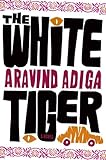The White Tiger - Aravind Adiga
Wednesday, July 29, 2009
 The White Tiger by Aravind Adiga
The White Tiger by Aravind Adiga
276 pages
Man Booker Prize 2008; Galaxy British Book Awards Author of the Year
My rating: 4 of 5 stars
"The story of a poor man's life is written on his body, in a sharp pen."
I did not expect to like or enjoy this book. As an Indian, I usually don’t like books written about the poor where they're describing abysmal living conditions or other horrible situations. It isn't a question of whether these things happen or not, but more a case of sensationalising and exaggerating the poor with the intention of gaining literary recognition or popularity as an author. All under the guise of showing the world the 'Real India'.
I think its crap
Its sad that they never write about the good stuff or the people who've had good lives and made it better. Good stuff doesn't sell books though.
Besides, I think you can't know poor unless you've lived it or seen it - and I doubt any of these authors have.
Getting back to the book now, like I said - I thought I wouldn’t like this book.
But I did.
There wasn’t anything in there I could identify with as an Indian - but at the same time I can see a lot of it could have happened to different people.
This was a refreshing read.
The book is written as a series of letters to the Chinese Premier Wen Jiabao who is supposed to be visiting India soon and is meant to show a side of India that the premier would not be privy to otherwise. It is written by Balram - a man who grew up in one of the nameless and faceless villages in India and made it out of the Darkness of his existence into the world of the rich - or the Light.
"India is two countries in one: an India of Light, and an India of Darkness. The ocean brings light to my country. Every place on the map of India near the ocean is well off. But the river brings darkness to India - the black river "
Balram is ambitious - a trait a poor man is conditioned not to have. He's a thinker. And he uses these skills to make it out of his village and the rut every poor man is in. By observing. By thinking. By killing his employer. And building a new life for himself.
His letter to the premier Wen describe how he came to be the entrepreneur he is today. With words that you wont forget long after you've finished this book.
Balram writes a lot about the relationship between a servant and his employer - and on some level this doesn’t apply only to the poor and their richer masters but to everyone who depends on another for their livelihood.
Balram's thoughts when his employer Ashok is contemplating life after his wife has just left him:
- "The point of living? The point of your living is that if you die, who's going to pay me three and a half thousand rupees a month?"
- "It squeezed my heart to see him suffer like this—but where my genuine concern for him ended and where my self-interest began, I could not tell: no servant can ever tell what the motives of his heart are. Do we loathe our masters behind a facade of love—or do we love them behind a facade of loathing?"
And a very interesting way of describing why the poor stay poor with an analogy on chickens in a rooster coup:
Hundreds of pale hens and brightly colored roosters, stuffed tightly into wire-mesh cages ….jostling just for breathing space…On the wooden desk above this coop sits a grinning young butcher, showing off the flesh and organs of a recently chopped-up chicken, still oleaginous with a coating of dark blood. The roosters in the coop smell the blood from above. They see the organs of their brothers lying around them. They know they're next. Yet they do not rebel. They do not try to get out of the coop"
.
.
"Every day, on the roads of Delhi, some chauffeur is driving an empty car with a black suitcase sitting on the backseat. Inside that suitcase is a million, two million rupees; more money than that chauffeur will see in his lifetime. If he took the money he could go to America, Australia, anywhere, and start a new life. He could go inside the five-star hotels he has dreamed about all his life and only seen from the outside. He could take his family to Goa, to England. Yet he takes that black suitcase where his master wants. He puts it down where he is meant to, and never touches a rupee. Why?
Because Indians are the world's most honest people, like the prime minister's booklet will inform you? No. It's because 99.9 percent of us are caught in the Rooster Coop just like those poor guys in the poultry market."
And some more interesting lines:
- "You were looking for the key for years / But the door was always open!"
- But what is the use of winning a battle when you don't even know that there is a war going on?
This isn't a book to read if you want to know the "real India". But it is entertaining. And what makes it a good book are words like the ones I've quoted above - observations that you realise have a grain of truth in them. Observations that are put in a unique manner that made me turn the page and realise this is good fiction.






0 comments:
Post a Comment